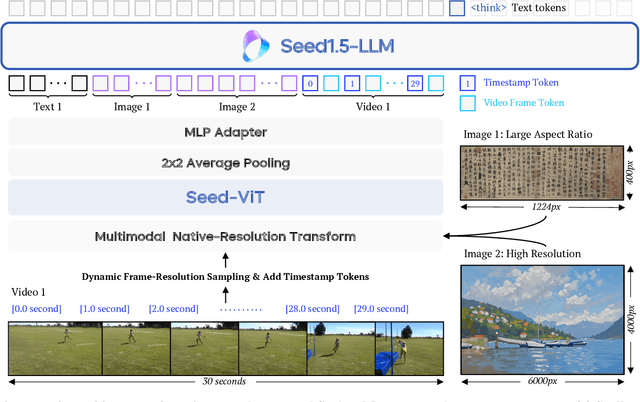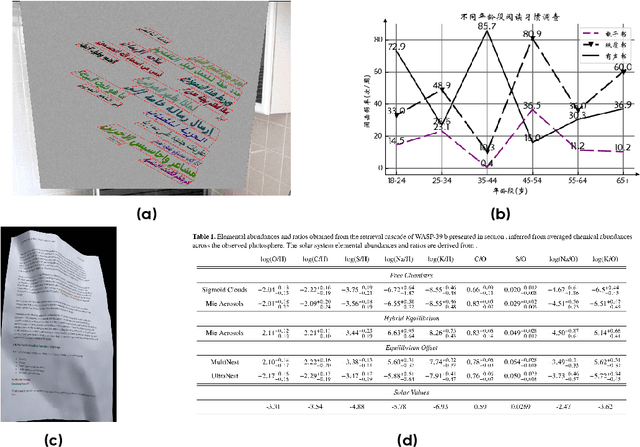Junda Feng
Seed1.5-VL Technical Report
May 11, 2025



Abstract:We present Seed1.5-VL, a vision-language foundation model designed to advance general-purpose multimodal understanding and reasoning. Seed1.5-VL is composed with a 532M-parameter vision encoder and a Mixture-of-Experts (MoE) LLM of 20B active parameters. Despite its relatively compact architecture, it delivers strong performance across a wide spectrum of public VLM benchmarks and internal evaluation suites, achieving the state-of-the-art performance on 38 out of 60 public benchmarks. Moreover, in agent-centric tasks such as GUI control and gameplay, Seed1.5-VL outperforms leading multimodal systems, including OpenAI CUA and Claude 3.7. Beyond visual and video understanding, it also demonstrates strong reasoning abilities, making it particularly effective for multimodal reasoning challenges such as visual puzzles. We believe these capabilities will empower broader applications across diverse tasks. In this report, we mainly provide a comprehensive review of our experiences in building Seed1.5-VL across model design, data construction, and training at various stages, hoping that this report can inspire further research. Seed1.5-VL is now accessible at https://www.volcengine.com/ (Volcano Engine Model ID: doubao-1-5-thinking-vision-pro-250428)
OVERLORD: Ultimate Scaling of DataLoader for Multi-Source Large Foundation Model Training
Apr 14, 2025Abstract:Modern frameworks for training large foundation models (LFMs) employ data loaders in a data parallel paradigm. While this design offers implementation simplicity, it introduces two fundamental challenges. First, due to the quadratic computational complexity of the attention operator, the non-uniform sample distribution over data-parallel ranks leads to a significant workload imbalance among loaders, which degrades the training efficiency. This paradigm also impedes the implementation of data mixing algorithms (e.g., curriculum learning) over different datasets. Second, to acquire a broad range of capability, LFMs training ingests data from diverse sources, each with distinct file access states. Colocating massive datasets within loader instances can easily exceed local pod memory capacity. Additionally, heavy sources with higher transformation latency require larger worker pools, further exacerbating memory consumption. We present OVERLORD, an industrial-grade distributed data loading architecture with three innovations: (1) A centralized and declarative data plane, which facilitates elastic data orchestration strategy, such as long-short context, multimodal, and curriculum learning; (2) Disaggregated multisource preprocessing through role-specific actors, i.e., Source Loaders and Data Constructors, leveraging autoscaling for Source Loaders towards heterogeneous and evolving source preprocessing cost; (3) Shadow Loaders with differential checkpointing for uninterrupted fault recovery. Deployed on production clusters scaling to multi-thousand GPU, OVERLORD achieves: (1) 4.5x end-to-end training throughput improvement, (2) a minimum 3.6x reduction in CPU memory usage, with further improvements to be added in later experiments.
ByteScale: Efficient Scaling of LLM Training with a 2048K Context Length on More Than 12,000 GPUs
Feb 28, 2025Abstract:Scaling long-context ability is essential for Large Language Models (LLMs). To amortize the memory consumption across multiple devices in long-context training, inter-data partitioning (a.k.a. Data Parallelism) and intra-data partitioning (a.k.a. Context Parallelism) are commonly used. Current training frameworks predominantly treat the two techniques as orthogonal, and establish static communication groups to organize the devices as a static mesh (e.g., a 2D mesh). However, the sequences for LLM training typically vary in lengths, no matter for texts, multi-modalities or reinforcement learning. The mismatch between data heterogeneity and static mesh causes redundant communication and imbalanced computation, degrading the training efficiency. In this work, we introduce ByteScale, an efficient, flexible, and scalable LLM training framework for large-scale mixed training of long and short sequences. The core of ByteScale is a novel parallelism strategy, namely Hybrid Data Parallelism (HDP), which unifies the inter- and intra-data partitioning with a dynamic mesh design. In particular, we build a communication optimizer, which eliminates the redundant communication for short sequences by data-aware sharding and dynamic communication, and further compresses the communication cost for long sequences by selective offloading. Besides, we also develop a balance scheduler to mitigate the imbalanced computation by parallelism-aware data assignment. We evaluate ByteScale with the model sizes ranging from 7B to 141B, context lengths from 256K to 2048K, on a production cluster with more than 12,000 GPUs. Experiment results show that ByteScale outperforms the state-of-the-art training system by up to 7.89x.
 Add to Chrome
Add to Chrome Add to Firefox
Add to Firefox Add to Edge
Add to Edge